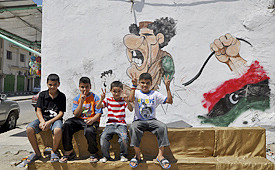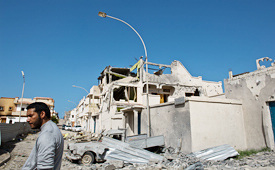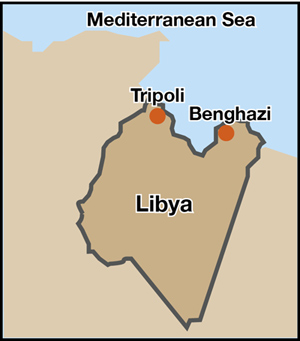|
 |
 |
|
FALLEN LEADER: Kids in Benghazi sit in front of a caricature mocking former Libyan leader Muammar Gaddafi (IC) |
LEGACY OF WAR: A man stands in front of a destroyed building in Sirte, hometown of former Libyan leader Muammar Gaddafi (LI MUZI) |
Li Guofu pointed out that Libya's reconstruction also brings opportunities for Chinese enterprises. He said many of Libya's infrastructure facilities and residences were ruined in the war. Chinese companies have advantages in contracting these projects because of their lower labor and material costs and high quality. And these projects are not the focus of Western companies.
"Chinese people and Libyan people have cemented a good cooperative basis over the past years," Li Guofu said.
He also said Chinese companies would be cautious about participating in Libya's reconstruction. They can engage in projects related to local people's livelihoods, such as water and power supply, telecommunications, construction and transportation. But since the country's situation is still quite unstable, they need to carefully consider their business decisions while refraining from rushing headlong into action, he said.
China's Views on Libya's Transition
- The international community should respect the sovereignty, independence, unity and territorial integrity of Libya, and develop relations with Libya on the basis of mutual respect, equality and mutual benefit.
- Under the leadership of the National Transitional Council, various parties in Libya should set in motion an inclusive political process, achieve reconciliation, take into full account the interests and desires of different groups, tribes and regions, and jointly build a peaceful and stable new Libya that enjoys growth and prosperity.
- The international community should actively reach out to Libya and support it in easing the humanitarian crisis and achieving economic and social reconstruction.
- China supports the leading role of the UN in Libya's post-conflict transition and reconstruction.
(Source: China's Ministry of Foreign Affairs)
Chronology of the Libyan Civil War
On February 15, massive protests erupted in Libyan cities, demanding an end to the 42-year rule of Muammar Gaddafi.
On February 26, the UN Security Council adopted a resolution to impose sanctions on Libya.
On March 13, Gaddafi's forces advanced toward Benghazi, the last stronghold of the opposition, the Libyan National Transitional Council (NTC), after retaking several NTC-held cities.
On March 17, the UN Security Council adopted a resolution to authorize a no-fly zone over Libya and "all necessary measures," excluding troops on the ground, to protect civilians under threat of attack.
On March 19, coalition forces led by the United States, France and Britain, and including Arab League members Qatar and the United Arab Emirates, started to strike targets in areas controlled by pro-Gaddafi troops.
On April 10, Gaddafi accepted a roadmap for ending the conflict presented by a delegation of four African leaders. But the NTC rejected the plan.
On June 27, the International Criminal Court issued an arrest warrant for Gaddafi, charging him with crimes against humanity.
On August 23, NTC forces captured the Bab al-Aziziya compound in Tripoli, forcing Gaddafi into hiding.
On September 16, the NTC was granted Libya's seat at the UN and the UN Security Council voted to ease sanctions on Libya.
On October 20, NTC forces seized Gaddafi's hometown Sirte and killed the former leader.
On October 23, the NTC declared the "liberation" of Libya in Benghazi.
(Source: Xinhua News Agency)
Libya Factbox
Area: 1.76 million square km, 95 percent desert or semi-desert
Population: 6.2 million, 90 percent Arab
Capital: Tripoli, population 1.7 million
Oil reserves: 43 billion barrels
Gas reserves: 1.48 trillion cubic meters
Economic pillar: the oil sector, accounting for more than 95 percent of Libya's annual export revenue
(Source: Xinhua News Agency)

| 